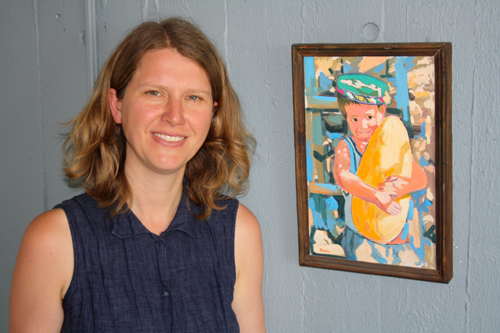
In some post-communist countries, women are becoming less modern than their mothers and grandmothers, according to Prof. Louise Grogan’s latest research.
The economics professor, who is studying households in post-communist countries in Central Asia, has found the situation for women in the non-industrialized areas is reverting back to traditional ways.
“During the era of communism, there was a big modernization drive to get away from the traditional household and to get women educated and working,” says Grogan. “But this communist ideal was never achieved. In fact, these countries are now even more traditional than they were during communism.”
Grogan’s research is focused on the Central Asian countries that gained independence with the collapse of the Soviet Union in 1991. As part of her investigation into the impact of the current economic market on the family household, Grogan has discovered that the women living in these areas are less educated, more likely to stay at home and take care of household duties, and more dependent on men for their livelihood than previous generations.
Unlike Russia, Moldova and Ukraine, areas such as Uzbekistan, Turkmenistan, Kazakhstan, Kyrgyzstan, Azerbaijan, Tajikistan and Armenia have not experienced industrialization, says Grogan.
“Tajikistan is close to 70-per-cent rural, so a majority of the population work as farmers or travel outside of the country in search of jobs,” says Grogan, who lived in the country for three years while conducting her research. “There is no work for women. Women essentially have no role outside of the household.”
As a result, these countries haven’t been able to thrive since the fall of communism, and women in particular are more restricted than ever, adds Grogan.
“Under communism, women used to go to school, but that is not the case anymore. Today you will find the grandmother went to school until Grade 11, but her granddaughter can’t read or write. Communists also wanted to break up extended families living together, but now it is typical for several generations to live under one roof in a traditional patrilocal household.”
Today a woman gets married through an arranged marriage and is expected to move in with her mother-in-law and help with the household duties, because having several generations under one roof saves money. The bride barely has time to get to know her new husband before he goes off to find work in Russia so he can send money home to his family.
Without being able to work outside the home, women have no livelihood and entire families depend on the man of the household to find a job abroad and send money home, says Grogan.
In fact, Grogan found in one of her studies that women work less in middle age if their first child is a son. This is likely because these women have money coming to them from their sons working outside of the country, she says.
“This shows the importance of sons to standard of living,” says Grogan. “More than 50 per cent of the gross national product in Tajikistan is migrants sending money back to their families.”
However, the wives do not reap the same benefits as the mothers. When husbands travel abroad, the marriage usually ends in divorce. The wife is then kicked out of the mother-in-law’s household and sent back home to her family, says Grogan.
“The men barely know their wives and don’t know when they will see them again, so they often start a new life in the countries where they have found work. It’s not uncommon for a woman to receive a text message from her husband wanting a divorce.”
Grogan’s most recent research, conducted with Berkley University PhD student Reid Hamel, has revealed that the growing rates of migration and divorce have led to a new trend of polygamy. Family households are increasingly becoming like compounds where several wives and their children live together.
“Women are happy being a third or fourth wife, because the men they are with are often rich, so they know they won’t migrate to find work and leave them,” she says.
Grogan points to a lack of an economy as the main driving force behind these countries reverting back to their old ways. Without any jobs available for men and women, there is no incentive to get an education.
“During the time of the Soviet Union, an education system was set up that wasn’t sustainable. Now in post-communist times, these countries have gone back to a more traditional society, because the successive generations are less educated. Until these countries are able to create jobs and sustain their own economy, not much will change.”